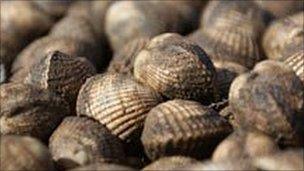Illegal Dee cockling rising, says Environment Agency Wales
- Published

Legitimate fisherman harvested 1250 tonnes of cockles this season worth £2.5m, according to EAW figures
Illegal cockling on the Dee estuary is on the rise, according to a report by Environment Agency Wales (EAW) which says legitimate harvesting netted £2.5m worth this season.
The agency brought 12 prosecutions for illegal cockling and suspended 15 licences over the last year.
The figures come as the Dee's licensed cocklers celebrate one of their most successful years.
They harvested 1250 tonnes this season, compared to 657 tonnes the year before.
Dylan Williams, from EAW, said: "This season we saw one of the biggest catches and highest value of cockles harvested from the estuary so far, contributing approximately £2.5m to the local economy.
"However, the high value of the cockles has also led to an increase in people taking cockles from the beds illegally.
"This type of illegal activity threatens the livelihood of licensed cocklers and can be incredibly dangerous to people who may be unfamiliar with the tides."
This is the fourth season that the cockle bed has been open in Flintshire.
The agency'sannual report, externalinto the Dee Cockle fishery said: "Buyers were keen to get as much cockle as they could, unfortunately this may have led to an increase in illegal cockling."
It said "sustained high prices" of £2,000 per tonne were the norm not the exception during the season.
In 2010 there were no prosecutions, compared with 12 in 2011 and there were five suspensions in 2010 compared with 15 last year.
The agency says it is stepping up its enforcement due to the rise in illegal cockling.
It puts the successful season down to good quality cockles left on the bed at the end of season.
It also says putting a daily quota in place so licensees crop the oldest and biggest cockles means small cockles are left to grow later in the season.
- Published2 September 2011